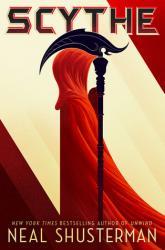
In a world where AI, artificial intelligence, known as the Thunderhead controls the world and has gifted humanity immortality, it gave humans the responsibility of death. Immortality is possible with the nanites embodied in cells to help cells replenish forever. Scythes are the only people that kill or nicely put glean. Citra and Rowan are selected by a scythe to apprentice and the discover the reality of human nature and the burden of death.
I think this is a good book, conceptually it’s definitely a step up from your typical dystopian book but it isn’t my favorite book for other reasons. There is a guy and a girl main character and they have to defy the expectations of society, creating romantic tensions which is pretty typical. The book lacked detailed descriptions which would have enhanced the action by creating more suspense. The biggest reason it is not my favorite is smalldetails that are don’t logically make sense. With the all knowingThunderhead it would make sense that technology would allow teleportation and other advancements. All these little details ultimately make the book only 4 stars out of 5.
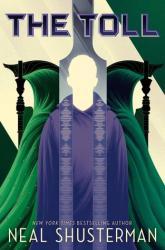
The Great Resonance has occurred and everyone has become unsavory, meaning they can’t communicate with the Thunderhead. That is except for one person, the Toll. Since no one can speak to the Thunderhead no one knows why they have become unsavory leaving the world in confusion. What most people don’t know is Endura the Scythe ring of islands sank when all the systems failed, or were instructed to fail. The leaders of the Scythedom drowned and Citra and Rowan are nowhere to be found.
The other books in the Scythe series had somewhat obvious endings while in “The Toll” I really didn’t know how the series would end which created a nice suspense in the book. Just when I thought things couldn’t get worse or the characters Citra and Rowan things get worse. The excerpts from the Thunderhead and the founding Scythes created a lot of foreshadowing and had each founding Scythe had a unique voice and quirks which was a nice detail. This book still lacks detail of the setting, clothing, and appearance of the characters like the other two books in the series but in this book it especially lacked detailed emotion. There was a Romeo and Juliet like relationship between Citra and Rowan, they were each other’s weakness, and would save the other even it meant sacrificing themselves. However the emotion and reasoning on why they are so in love is unclear. Other than training as apprentices together and kissing once in the first book the author doesn’t really describe why or how they fell in love. This book had
a lot going on at once it was hard to understand how much time had passed or what was happening when. Overall the theme of this series is advancements don’t make humans lose their humanity, no matter how perfect a world there will be those who chose corruption and power, and those who chose to live a simple quiet life.
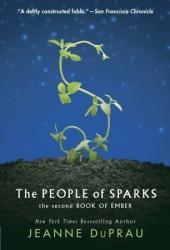
This is the second book of Ember. The book is about the people of Ember emerging to the surface. The people of Ember find the city of Sparks. The Ember people and the Sparks people have quite a bit of conflict. In the end the book resolves itself.
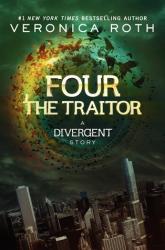
“Four the traitor,” is one of four stories told by the perspective of Tobias Eaton aka Four. This book take place two years after “The Son.” Within that time he’s been keeping busy with spying and keeping in touch with his mother. While spying on Mac and Jeanine he learns of their devious plan to take over Abnegation. All though the book isn’t as detailed and goes though his feelings and adventures like Beatrice is a pretty good book.
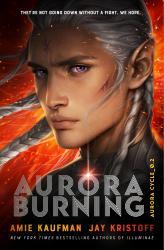
Aurora Burning by Amie Kaufman and Jay Kristoff is the second book in the Aurora Cycle series. It picks up after the ending of the first book, with the crew of Squad 312 dealing with the loss of one of their own. With prices over their heads and enemies building around them all wanting a bite of the squad, Tyler Jones and his crew quickly have to decide where to turn to next. I thought this book was pretty good, having the same sort of humor and sarcasm as the first book. Some of the decisions or responses were a bit
stereotypical in my opinion (and some of the plot twists weren’t as shocking as you would’ve hoped), but every book has its flaws. Despite this, I still enjoyed it, and it was a fun read. I liked the character development of Finian and Zila throughout the book and, as always, the futuristic galaxy world was very enjoyable to read about. I think this book is worth picking up if you have read the first book.
Reviewer grade: going into 11th
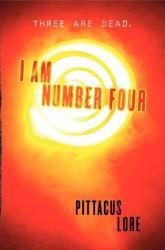
I am Number Four is about the main character John Smith. John and his caretaker Henri try to live in the world without being noticed. At the start of the book, John and Henri go from Florida to Paradise, Ohio, where John try's to stay unnoticed at another new school. John doesn't usually make friends because he moves alot but in Paradise he makes friends with a alien conspirator Sam Goode and and a pretty girl named Sarah Hart. And an enemy named Mark James.
The reason I chose this book is because its about a teenager trying not to be noticed in a world where he doesn't belong. Many events like a scare where Henri seems to be missing makes John become more aware of the world and the people it it. My favorite part about this book is when John actually becomes aware of the world and grows in many ways throughout the book. My least favorite part about the book is when John has to leave Sarah behind and go somewhere with Sam and Someone like him Six.
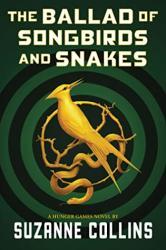
If you're like me, you've been looking forward to the new Hunger Games prequel, The Ballad of Songbirds and Snakes, since its announcement last year. After all the anxious waiting and counting down the days, I found that this new novel, focusing on future villain, Coriolanus Snow, is not as good as the original trilogy but still holds its own and has its place in Collins' universe of Panem.
The Ballad of Songbirds and Snakes is a villain background story. The main character-- for I certainly would not call him a protagonist, even 65 years earlier-- is Coriolanus Snow, future tyrant president of Panem and one of the most despised villains in all of young adult dystopian literature. Here, Snow has an ego, he has big plans, dreams and ambitions for the future of his country. Coriolanus is an orphan after the war that spurred the Hunger Games. The Snow household is broken down and poor, and Coriolanus lives with his grandmother and fellow orphaned cousin, Tigris (yes, that very same Tigris from Mockingjay that Katniss and her squad hid with while in the Capitol. This connection is one of the most interesting in the book, because here, Tigris and Coriolanus are best friends as well as cousins, always looking out for one another and sharing a tight bond. The obvious deterioration of their relationship is never addressed in the book, and I desperately want to know what went sideways between them now.) Coriolanus is a student at the Academy, a high school, and is chosen as one of the 24 best and brightest Capitol students to mentor a tribute in the 10 Hunger Games.
One important thing to note and understand about this book is that the Hunger Games are very very different from where we join them 65 years later. The tributes are abused and starved. The arena is not high-tech or glamorous. The television viewership is low. Most people do not even watch the games at all. All of that changes after this book, I would presume.
Coriolanus, who is hated by the leader of the Academy, Dean Highbottom, is consequentially assigned to mentor District 12 female tribute, Lucy Gray Baird. Lucy Gray is the true protagonist of this novel, and a strange one at that. She is part of a 'Covey', a traveling musical family who got stuck in District 12. She is strange to Coriolanus and the other Capitol children. She is musical, cunning, and not to be underestimated.
One of my wishes for this book is that there would be a romance between Lucy Gray and Coriolanus. There was, and unfortunately, it did not live up to my expectations, which greatly added to my minor issues with this book. Collins greatly crafted a love triangle in the original Hunger Games trilogy, and I was so excited for more of that great romance that made you root for two people to end up together. The romance between Coriolanus and Lucy Gray seemed disjointed, rushed, and absurd. It almost seemed like Coriolanus was using Lucy Gray, which of course is false since he had nothing to gain from loving a poor girl from District 12.
Coriolanus prepares Lucy Gray for the arena while some Hunger Games traditions are introduced-- the betting, mutts and TV host and interviews are all started in this book. The Head Gamemaker at the time is Dr. Gaul, a psychotic and mutation-obsessed woman who takes interest in Coriolanus. Readers should expect to be creeped out and disturbed by Dr. Gaul throughout the novel.
Drama unfolds before the Games even begin, and there are many, many characters and side plots introduced and finished before the Hunger Games even begin. The actual part of the Hunger Games was my favorite part of the novel. Collins truly is a master of writing stories set in the arenas. I will not spoil who wins the 10th Hunger Games, but expect to be surprised by the turn of events right after the Games conclude.
My only other problem with this book is it actually felt like three books instead of one. Like the rest of the series, it is divided into three sections, and each felt like it's own standalone story. The third section Iread very fast. The first was very slow. And the middle was the best, with the arena and Hunger Games.
One of the things about this book that I enjoyed tremendously is that it does not paint Coriolanus as a hero, even back then. He is still cunning and a little evil, especially at the surprising ending. Coriolanus is never written as a good person. Instead, the good people around him are at his disposal.
Another thing to note is the literalness of the title. There are all three-ballads, songbirds, and snakes, in this novel. It is in no way symbolic or metaphorical. There is a lot of music, for Lucy Gray, and to add a lighter tone. I liked the inclusion of all the music, though it was a little strange to have so many songs included in full, with all their lyrics and everything. There are several songs from the original trilogy in this book, The Hanging Tree among them, and I enjoyed the inclusion of those.
The Ballad of Songbirds and Snakes does not feel like a Hunger Games novel. It feels like a companion to Collins' original trilogy, but not directly connected to that world. That being said, it is a very compelling and originally imaginative story, that only suffered from a few disjointed elements. This prequel does not quite live up to the original beloved stories of The Hunger Games, but comes very close and presents a new take on Suzanne Collins' world of Panem.
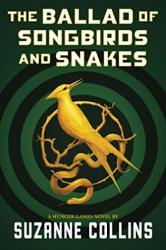
This book is fantastic! The Ballad of Songbirds and Snakes adds a whole new level of depth to the Hunger Games Series main antagonist, Coriolanus Snow, and to Suzanne Collins' dystopian world. This novel shows the journey of Coriolanus Snow from an eighteen year old boy trying to find his place in the world to the ruthless president in the Hunger Games Trilogy. I could not put this book down. It is the perfect addition to a fantastic series. I highly recommend this novel for any teenaged reader or fan of the Hunger Games Series.
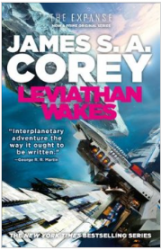
For years, my co-worker has been suggesting that I read the Expanse series of books. Before I finally got around to the audiobook for Leviathan Wakes, I took a slight shortcut and watched the television series on Amazon. This came in handy because I was able to pick up this book and immediately be able to visualize what was happening and who the characters were. Sure, the actors cast in the show are slightly different from their literary counterparts. Still, overall there was a lot in this book that I had already experienced with the television show.
I will applaud this book for being a hard science fiction story, but not shoving the calculations in the reader’s face. Sure, The Martian did an excellent job of explaining all the scientific challenges of interplanetary travel. However, Leviathan Wakes took this a step further and created a universe that’s still controlled by the same physical laws we encounter in the real world. Unless you know what you’re looking for, you’d never realize that the little ways to make life livable in outer space would manifest in the forms presented in this series. Basically—to quote the title of a Heinlein book—Gravity is a Harsh Mistress.
And while the television show had lots of different plotlines to follow through its four seasons, I do like how Leviathan Wakes focused on just two main characters and the discovery of the Protomolecule. Although—even though both characters came from different backgrounds—I would have expected their reactions to situations would have been more drastically different than they were. Still, even if both Miller and Holden felt like very similar characters, they were both written well enough that it was an entertaining ride, nonetheless.
A perfect blending of story and hard sci-fi, I give Leviathan Wakes 4.0 stars out of 5.
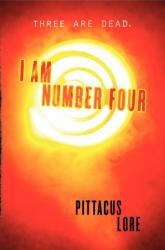
This is my current favorite book! John Smith isn't just an ordinary teen. He was born on the planet Lorien. He is one of nine children taken to Earth with superhuman powers, these powers are known as legacies. The first three have fallen, and John is next on the kill list. John's character is written so well, that you can easily understand his emotions and actions. John has a hard time with a foot in both worlds. He has to balance himself between being your average teen and being his superhuman self. Many people have split lives, bouncing from one personality to another. Sometimes it can feel like you can't always be your true self around everyone and John portrays this lifestyle perfectly. John was such a relatable character.
This book was predictable at times, but it did have some crazy plot twists. Most of this book included of the characters making plans and I would have liked to see the characters just play out the situations and not always have a step-by-step execution. I read the last hundred pages or so all at once! The climax was so thrilling and I couldn't put the book down! The ending was a bit abrupt, but I would still recommend this book to any fiction reader!
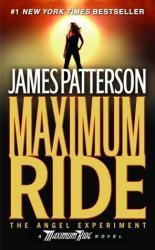
Maximum Ride is about a group of kids who seem to be ordinary, except they have wings and they can fly. Max, the main protagonist protects her family called " the flock " from the scientists who genetically engineered her and her family in horrible experiments. I like the manga version of this book because the art is awesome.
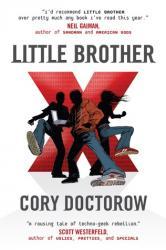
Little Brother is a book about what happens when in an attempt to keep citizens safe after a terror attack the government terrorizes it's own citizens. The government jails and torture teens in an effort to find terrorist. One of the teens they torture is a rebellious computer whiz and hacker name Marcus. Marcus is broken and humiliated while being detained and interrogated by home land security. When he is released he vows to get revenge.
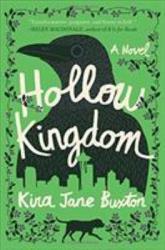
This debut novel is a refreshing romp through the Apocalypse narrated by a foul-mouthed domesticated crow whose only knowledge of the world is TV. This mash-up of "The Incredible Journey" and "The Walking Dead" has an environmental message, focusing on humankind's increasing disconnect from the natural world. You may want to reconsider all those hours of screen time. But do read this novel, which while a tad long, chronicles the adventures of S.T. (not a library appropriate name) and his heroic steed, the dim-witted dog Dennis. The crow tries to save humankind, learns about himself and the natural world in a frightening new Seattle featuring an emerging predator.
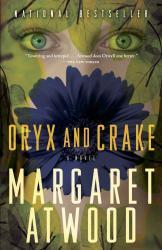
"Oryx and Crake" follows the character Snowman who is seemingly the last surviving human on Earth as he recounts the events that led up to his dystopian present. In this speculative fiction novel, animals are genetically modified to harvest organs for human transplant and spliced together to create fantastical hybrids like “rakunks” that are part racoon and part skunk. In addition, a new human breed is created to be physically flawless and void of normal human characteristics like envy or jealousy. This incredibly thought-provoking book challenges the reader to think about our present, and the choices we make that may lead us down a similar apocalyptic path. For example, it forces us to question how far are we willing to go with genetic modification. Although Atwood deals with serious topics in this book, she addresses them with such humor and over-the-top situations that the book is remarkably enjoyable. Furthermore, the characters of Oryx and Crake are some of my favorite literary characters.
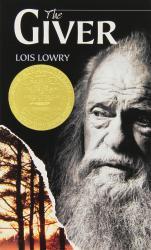
I read this book in my eighth grade L.A. class and surprisingly it stuck even though I thought it was boring and had a hard time comprehending most things. The book does have a PG-13 vibe where it does carry some “sexual content”, but it’s basically about a really strict and emotionless society. A society where everyone was equal which sound really boring. I’m not going to lie that this was the most boring part in the book, learning about how strict it is and how love is forbidden kinda lame. The only interesting parts were when the main character would rebel against the society’s values by expressing his emotions, finding love and most importantly running away so he could give baby Gabriel a less uncompromising and more unconfined life. The most annoying part of the book is the ending not knowing what happens to Jonás and Gabriel. (The movie was better)
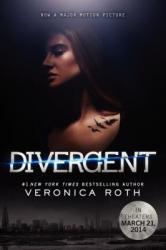
In a city with no contact to the outside world, everyone is divided into factions. In this world Beatrice needs to navigate doing what is right and what she wants while being different. In this book being different is dangerous and deadly, so she must keep it all secret. This book can keep you reading and interested in. This book is easily one of my favorite books because of how well written it is and the amazing plot The book is very easy to visualize and keep up with. I recommend this book to anyone who loves action, romance and suspense.
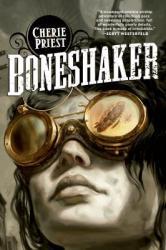
Boneshaker is the novel that kicks off Cherie Priest's "Clockwork Century" series - one of the most widely acclaimed book series in the Steampunk genre. Boneshaker explores an alternate history of the United States during the Civil War era. The plot centers around Briar Wilkes, the widow of the infamous Leviticus Blue - inventor of the titular boring machine that he was commissioned to create, in order to retrieve the vast veins of gold that are hiding under the thick ice of Alaska in the midst of the Klondike Gold Rush. During a devastating test run, the Boneshaker destroys the foundations of a good portion of Seattle, killing many, and releasing a dangerous gas that turns survivors into zombies. Leviticus disappears, and walls are erected around Seattle to contain the "blight" gas, and the "rotters". Briar does her best to survive and raise her son Zeke in the "Outskirts" of Seattle, suffering the prejudice shown to both of them, due to her husband's actions. Zeke is convinced that he can prove that his father was innocent, and that the destruction was purely unintentional, so he journeys beneath the wall, into Seattle to find the evidence he needs. Unlike Leviticus, Zeke's
grandfather (Maynard Wilkes) is revered as a folk hero, having lost his life in the exodus of Seattle, freeing inmates from the prison. Zeke feels this may help him if he runs into trouble within Seattle's walls. When Briar finds Zeke gone, and what his intentions are, she arms herself with Maynard's accoutrements and catches an air ship over the wall, to search for her son. Separately, Briar and Zeke find people who help to save them from being devoured by the "rotters", and attempt to aid them in their respective searches. Briar learns of the mysterious Dr. Minnericht who seems to run the
doomed city within the walls, and that many are convinced that he is in fact, Leviticus Blue (something she doesn't believe). When events draw Briar and Zeke both into Dr. Minnericht's stronghold, it seems the heart of the mystery
will be resolved with this fateful meeting.
Boneshaker is an epic foray into a dystopian alternate universe, and readers of various genres, are sure to find many wonders to be fascinated by in this version of Washington's famous "Emerald City".
In addition to physical book and audiobook formats, Boneshaker can also be downloaded and enjoyed at home, in either ebook or eaudiobook form.
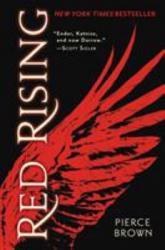
It is difficult to review a book like Red Rising without noting the heavy comparisons to The Hunger Games. Perhaps this speaks to the strength of The Hunger Games’ format, but there are almost too many parallels to ignore. Dystopian class-separated society? Check. A skilled lower-class individual who defies the odds? Check. Violence and a romantic subplot? Check and check. About the only difference between the two is that Red Rising takes place on Mars and over a few years instead of a week or so. Of course, it’s hard to tell the timespan since important details always seem to be missing from the first-person narrative.
If anything, I’d peg Red Rising as the gritty, over-violent, and over-sexualized version of The Hunger Games. If The Hunger Games appeals to girls and women, Red Rising should appeal to boys and men. A lot of the content in this book felt a bit over the top and unnecessary to the plot. Granted, the action was pretty well written, and at least a few of the characters seemed to have their distinct personality. I didn’t care for the more “aware” portions of the prose, as they seemed out of place in a “look how flowery I can write this simple scene” sense.
Another split from The Hunger Games comes in the form of the main character. While Katniss subjected herself to the brutality selflessly and sacrificially, Darrow was solely focused on a simple-minded goal: vengeance. Consequently, while I could understand Darrow’s motivation, it failed to have many nuances. It ended up being so repetitive that I rolled my eyes every time he brought up his past. Still, there were a few good twists and some great character development through this volume. There’s enough of setup at the end of this book that I’m curious where Golden Son takes the story.
A male-oriented knock-off of The Hunger Games, I give Red Rising 3.5 stars out of 5.
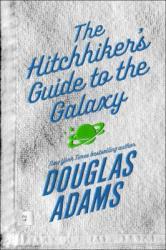
Five stars (If you don’t laugh at this, then I don’t know what cave you’ve been living in) The HitchHiker's Guide to the Galaxy is a sci-fi comedy so specific that it is funny. Between the absurd circumstances and the very specific jokes, I couldn’t stop laughing. The start of the book is normal, but once you get into it it keeps you laughing as it gets weirder and weirder. The events that happen are so improbable that it turns it the other way and makes it very probable. When reading the Guide, don’t forget your towel!
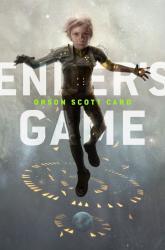
5 Stars(Though it’s not for everyone)
Ender's Game is a dystopian future revolving around a little boy named Ender. I like that the character is real, while everything around him is a mess. It shows him hurting others that try to hurt him. The details and unraveling suck you straight into the book. You definitely feel as though you are there. It’s like watching the ripples on a pond after you throw a rock into it.


